My most challenging client: Me
Fibroids, anaemia, Mayan abdominal massages, herbalists, DUTCH tests, and updates on my hormone health journey
It was a bright and sunny Saturday as I walked up a little side street in Hackney, east London, toward my destination, where I’d be spending the next 90 minutes.
Heading down the stairs into the basement, I couldn’t see much at first as my eyes slowly adjusted to the dim lighting after being out in the bright sunshine.
I was here for my first ever Mayan abdominal massage, with an Arvigo-trained therapist.
She greeted me warmly, showed me where the bathroom was so I could empty my bladder, and then led me to the therapy room, where we sat and discussed the comprehensive test results and intake form I’d sent in advance.
As I lay on the massage table, I found myself wondering if I needed to pee again. She guided me through some simple breathwork — inhaling, exhaling, relaxing, tuning into my body. Then, after applying a little lavender-infused almond oil over my abdomen, the massage began.
Turns out I did need to pee — because as soon as she massaged my womb area, I had to get up and go to the bathroom again (I blame the coffee I had an hour earlier)!
After that, I was able to fully relax into the massage. It was a beautiful experience: deeply moving, healing, intimately connecting me with myself. She worked over my womb, ovaries, liver, small and large intestines, colon, pancreas — all these organs working so hard every day to support me. It felt good to give them this nourishment. To connect with them, with my body, in such a tangible, visceral way.
I needed this.
When I got home afterward, I promptly curled up in bed and had a deeply restorative hour-long nap — with my cat, Miss Ella, snoozing by my side. ❤️
2025 has been a challenging year so far, and for most of it, I’ve been in survival mode — putting one foot in front of the other, doing my best to stay afloat.
“You’ve been on quite a health journey haven’t you?”
Those were the first words my medical herbalist said to me earlier that day, as we began our long-awaited first appointment. I’d been thinking about booking in with a herbalist ever since I found out about the fibroids nine months ago — and had been trying to pin down a date for the past six months, with various hold-ups and delays getting in the way.
She asked about my entire menstrual history, probing deeply into my memories from puberty until today (thankfully, my cycle tracking data came in very handy)! I gave her every detail I could recall, layering in the countless health challenges and solutions I’d encountered over the years, and explaining the step-by-step journey I’d taken to address my heavy periods.
“You’ve already done so much of the groundwork. You’ve made incredible progress. You should be proud of yourself” she said as our session drew to a close.
It was exactly what I needed to hear.
Because the truth is, it is frustrating. It’s exhausting, trying to navigate health issues, especially when it feels like nothing is moving — especially when you’re walking the slow, winding path of natural healing. You have to be patient. Root-cause healing doesn’t happen overnight. Most of the time, you have to trust the process even when you can’t see the results yet.
Going it alone only makes it harder — and that day, I was reminded that it’s okay to lean on others. It’s okay to need support.
As a hormone health coach, I realised I often put needless pressure on myself to “fix things” on my own, simply because I have the knowledge.
But after speaking with the herbalist — and hearing her say that whenever she needs herbal medicine herself, she works with another practitioner — I felt much more at ease about reaching out for support.
(Warning: some graphic imagery below).
As I’ve shared in previous posts, the big focus of my current health journey is managing my heavy periods, caused by uterine fibroids (which I first discovered last July).
The image above is from my ultrasound scan. This fibroid — (by the way, I really need to give it a name… any suggestions? 😆) — is the main culprit behind the heavy bleeding, and my ongoing struggle with iron deficiency anaemia.
To give you a bit of perspective: in my most recent bleed, I estimate I lost around 200ml of blood, after carefully tracking how often I had to change my pads (about every 30 to 60 minutes).
Anything above 80ml is considered heavy.
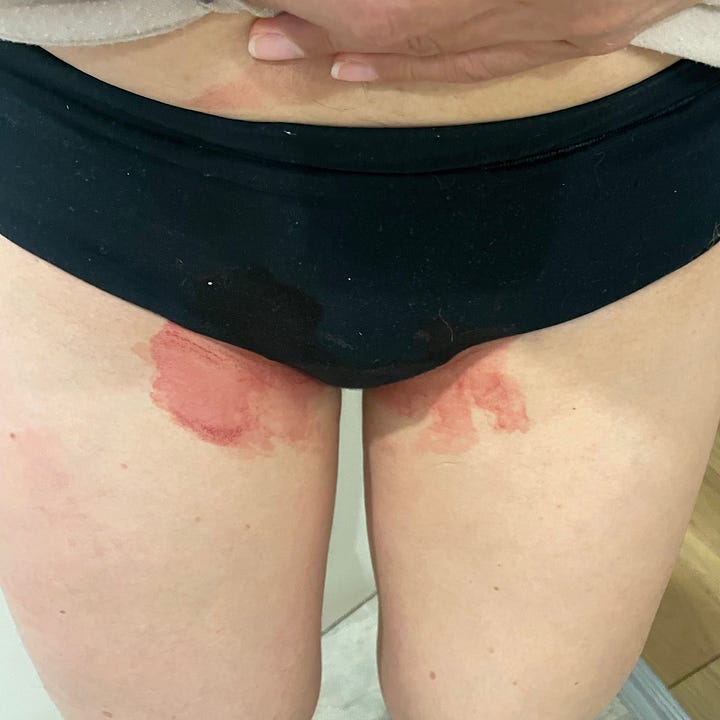
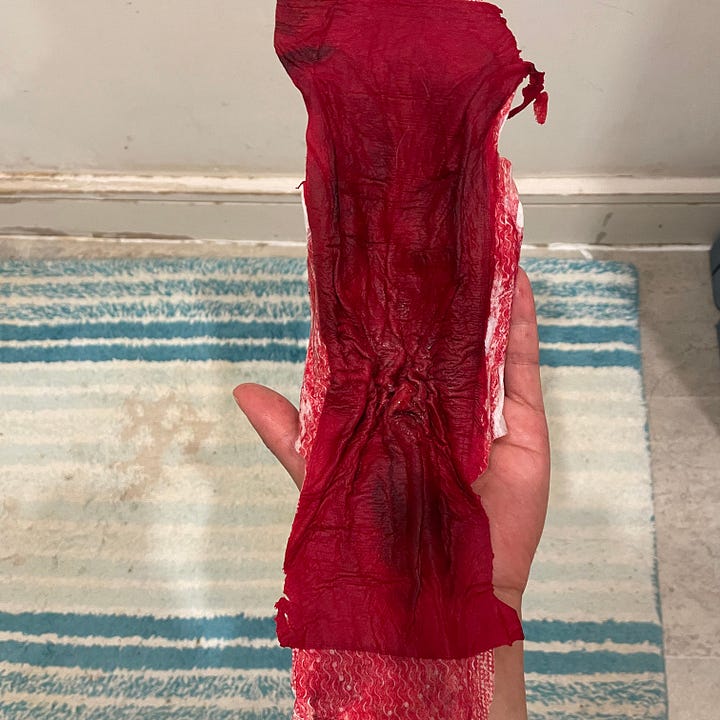
Since finding out about the fibroid, I’ve been throwing everything in my arsenal at it. Doing all the “right” things, as a good hormone health coach should. Focusing on liver and gut health. Supporting detoxification and clearance of excess oestrogen with cruciferous vegetables and sulforaphane. Promoting healthy ovulation and progesterone levels. Managing blood sugar regulation and (as best I could) my stress levels.
And of course, running a DUTCH Complete test (Dried Urine for Comprehensive Hormones) to get deeper insight.
I mentioned before that I would share my DUTCH results once they arrived. Well — they came back a few weeks ago, and I’ve been sitting with them, digesting and (with some help) interpreting what they mean.
In short: the results were not quite what I expected!
Because fibroids and heavy periods are usually associated with high or excess oestrogen, I fully anticipated that my results would reflect this. But… that wasn’t the case.
My results actually showed I have low oestrogen and low androgens (DHEA and testosterone). Say what?
I dug deeper. I asked questions, sought opinions. Sometimes, unfortunately, I was met with dismissal and told the test was inaccurate, because of course I had high oestrogen if I had fibroids and heavy periods.
But deep down, I trusted my body. My results matched my symptoms. I knew my truth. So I kept going.
I turned to AI as a research assistant — and honestly, it’s been incredibly helpful. It helped me synthesise a huge amount of data: test results, symptoms, personal history, research articles and translated them into useful summaries and insights. It also helped translate dense PubMed studies into “plain english”.
Through all this digging, I uncovered a few key drivers likely behind the formation of my fibroid:
Previously elevated systemic testosterone levels — I had severe acne on my cheeks throughout my 20s. A 2015 study found that high testosterone increases the risk of fibroid formation by 33%, and when combined with high oestrogen, that risk jumps to 52%.
Previous long-term use of the progestin-only pill — I was on it for about 10 years. The same study showed that using the mini-pill increases fibroid risk by 1.8 times.
Previous use of the copper IUD for 7 years — this created chronic low-grade inflammation in my uterus. Another study found an association between long-term IUD use and fibroid development.
Previously poor gut health and elevated beta-glucuronidase levels — meaning my body was reabsorbing more oestrogen and struggling to detoxify it properly.
High systemic inflammation, before I cleaned up my nutrition — I used to have debilitating period pain before I discovered I was gluten and lactose intolerant.
What does all this mean for me now?
It means that although my hormone levels are quite low today, the groundwork for the formation of my fibroids was laid over the past 20+ years.
It means that my current heavy bleeding is likely the result of mechanical and vascular issues — changes in the blood vessels and distortion of the uterine cavity — rather than an oestrogen-dominant state.
It validates my experience of low hormones. It reminds me that it’s not always as simple as “high hormones = fibroids” — although for many people struggling with similar symptoms, high oestrogen is often a major factor and should absolutely be one of the first things investigated. But this journey has shown me just how much of an individualised process hormone healing needs to be.
It means that targeted herbal medicine — such as red raspberry leaf, which tones and astringes the uterine lining — could be key to reducing my heavy, dysfunctional bleeding.
It also means I need to tread carefully when supporting my hormonal health.
On one hand, my low hormone state has brought symptoms like brain fog, fatigue, low motivation, low libido, and low mood. I do worry about my future osteoporosis risk (it runs strongly in my family: my mother, grandparents, aunts, and uncles have all struggled with it).
On the other hand, jumping straight into HRT or trying to aggressively raise my hormone levels wouldn’t be wise right now — because it could stimulate further fibroid growth.
It means I have to double down on supporting my body as I navigate this monthly blood loss, because the anaemia is really kicking my butt (the week or so after my period is particularly tough).
Iron deficiency anaemia also mimics many of the same symptoms — my tissues and organs are literally being starved of oxygen.
It means accepting that between the low hormones and the anaemia, my physical resources are simply depleted. So I have to adjust my approach to nutrition — focusing on eating enough throughout the day, rather than the societal norm of “eating less”.
I also have to be mindful with my lifestyle choices — not overdoing even the healthy stressors like exercise, fasting, sauna, or cold plunges.
But it also means celebrating how far I’ve come in my health journey!
The fact that my cycle has been pain-free since 2019 (an incredible win!)
The fact that my DUTCH test shows healthy oestrogen metabolism and very healthy progesterone levels (another huge win!)
The fact that realistically, my fibroids could have been so much worse — causing daily pain or growing much larger — if I hadn’t made the lifestyle and nutrition changes I committed to over the past 5–6 years.
It means giving myself grace, and not berating myself for not being able to “fix” everything perfectly (hello, perfectionist tendencies — I see you 👀).
It means nourishing and caring for my body, which has carried me through so much over the decades.
It means continuing to get external support — from my herbalist, my Arvigo massage therapist, and my nutritionist.
It means continuing my cycle tracking (having that data is truly invaluable), prioritising self-care and stress management, and most importantly — finding joy wherever and whenever I can.
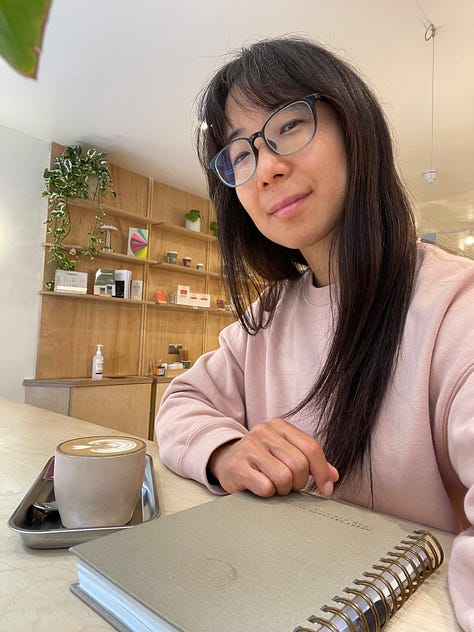
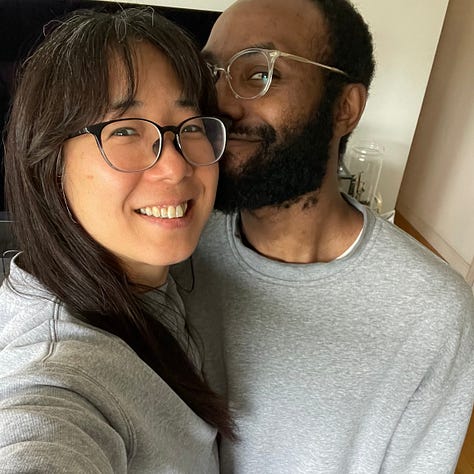
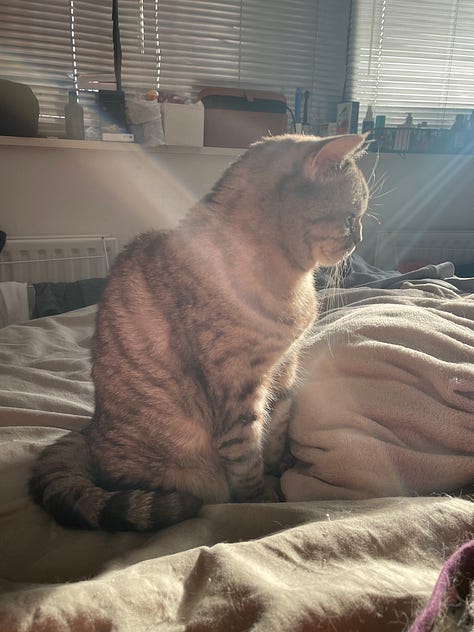
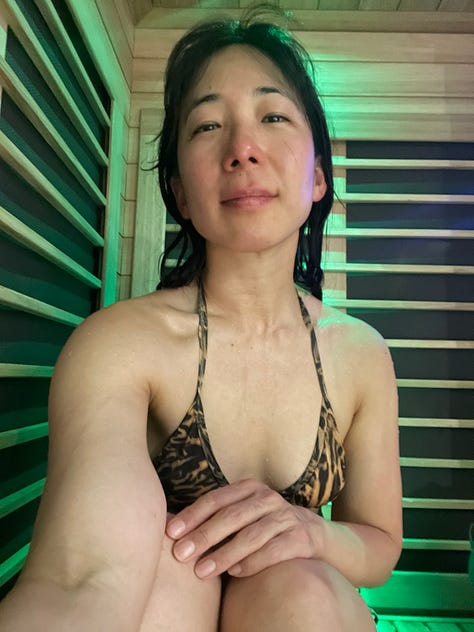
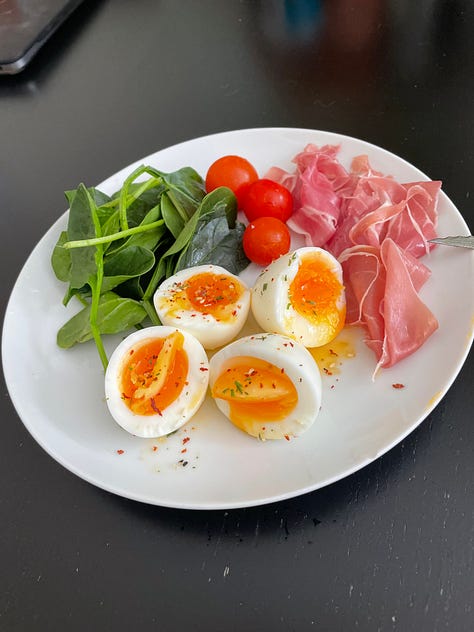
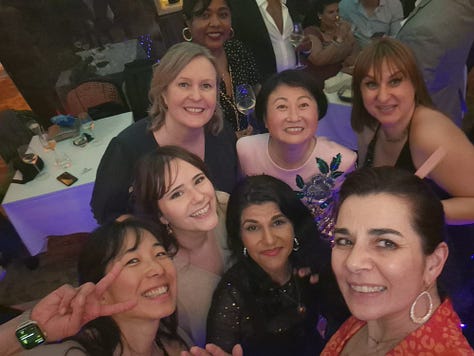
Ok this has been a long one! Thank you for being here, and for witnessing this very open and honest sharing of my hormone health journey.
If any part of this resonated with you, or if you’re navigating your own hormone or health journey, I’d love to hear from you.
Feel free to share your experience in the comments — it’s always so powerful to know we’re not alone.
Sending you much love and joy.












Great share, I was diagnosed with 3 fibroids about 10 years ago and have worked hard to avoid surgery, successfully! They can be stressful and as a 49 year old woman, I have always been shocked by how little our world speaks about them. I am intuitive and attentive to my body and before I was diagnosed with them, I had NEVER hear of them. Here's to you share and continued healing!